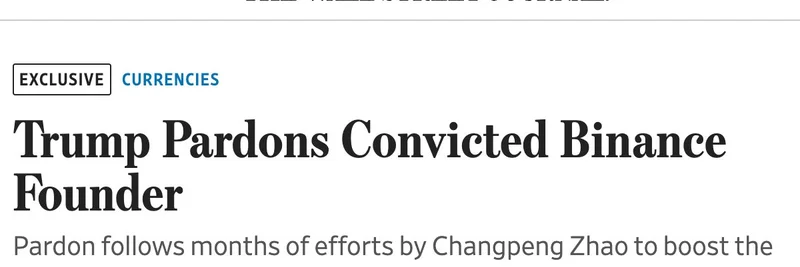In the fast-paced world of cryptocurrency, where meme coins like Dogecoin and PEPE often steal the spotlight, bigger regulatory dramas can have ripple effects on the entire ecosystem. Recently, a tweet from BitGo CEO Mike Belshe sparked conversations about fairness in crypto regulations, directly calling out Senator Elizabeth Warren's take on the pardon of Binance founder Changpeng Zhao (CZ). Let's break it down step by step, explaining the key terms and why this matters—even for meme token enthusiasts.
First off, the context: Senator Warren posted about CZ's guilty plea to a "criminal money laundering charge," his subsequent prison sentence, and how he allegedly financed President Trump's stablecoin project while lobbying for a pardon—which he ultimately received. She argued that if Congress doesn't curb such "corruption," it'll be complicit. Her post included a screenshot from a Wall Street Journal article highlighting the news.
Belshe, who's no stranger to the crypto scene as the head of BitGo—a major player in digital asset custody—fired back in his tweet. He corrected Warren, noting that CZ actually pleaded guilty to violating the Bank Secrecy Act (BSA) by not maintaining an effective Anti-Money Laundering (AML) program. AML, for those new to the term, refers to policies and procedures that financial institutions must implement to detect and prevent money laundering—think of it as the guardrails that keep illicit funds out of the system.
Belshe emphasized that while this violation is serious, CZ is the only person to ever serve jail time solely for it. In contrast, traditional banks like TD Bank have faced billions in fines for massive AML failures without any executives going to prison. For example, TD Bank recently admitted to letting hundreds of millions in dirty money flow through their systems tied to fentanyl trafficking, yet they just paid a hefty fine and promised to fix things—no jail for the bosses.
This disparity, Belshe argues, shows how crypto figures are "unjustly persecuted" compared to their traditional finance counterparts. It's a point that resonates in the meme coin community, where platforms like Binance play a huge role in listing and trading viral tokens. Harsh regulations on exchanges could stifle innovation, making it harder for new meme projects to gain traction or for traders to access them safely.
The tweet has garnered significant engagement, with over 1,300 likes and hundreds of replies. Some users echoed Belshe's sentiment, calling for accountability in politics and banking. Others debated the nuances, like whether CZ's plea was a way to avoid harsher charges or if the pardon sets a dangerous precedent. One reply even suggested suing Warren for libel, highlighting the heated emotions around this topic.
Why does this matter for meme tokens? Binance, under CZ's legacy, has been a launchpad for countless meme coins, from Solana-based hits to Ethereum classics. A pardon like this could signal a more crypto-friendly environment under the current administration, potentially easing regulatory pressures that have loomed over exchanges. That might mean more listings, better liquidity, and fewer barriers for community-driven projects. On the flip side, critics worry it could erode trust if it appears as favoritism, especially with mentions of CZ boosting Trump's crypto ventures like World Liberty Financial—a stablecoin project aimed at DeFi accessibility.
In the end, Belshe's response isn't just a clapback; it's a spotlight on the double standards in financial regulation. For blockchain practitioners and meme token holders alike, staying informed on these developments is key to navigating the evolving landscape. If you're trading memes or building on-chain, keep an eye on how pardons and policies like this could shape the future of crypto.
For more insights into how regulatory news impacts meme coins, check out our knowledge base on meme token regulations. And if you want to dive deeper into the original thread, head over to the tweet on X.



